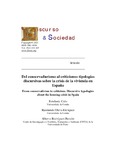Mostrar o rexistro simple do ítem
Del conservadurismo al criticismo: tipologías discursivas sobre la crisis de la vivienda en España
| dc.contributor.author | Calo, Estefanía | |
| dc.contributor.author | Otero-Enríquez, Raimundo | |
| dc.contributor.author | Rodríguez-Barcón, Alberto | |
| dc.date.accessioned | 2024-09-02T14:03:00Z | |
| dc.date.available | 2024-09-02T14:03:00Z | |
| dc.date.issued | 2021 | |
| dc.identifier.citation | Calo García, Estefanía; Otero Enríquez, Raimundo; Rodríguez Barcón, Alberto (2021). Del conservadurismo al criticismo: tipologías discursivas sobre la crisis de la vivienda en España. Discurso y Sociedad, 15(2), 244-267 | es_ES |
| dc.identifier.issn | 1887-4606 | |
| dc.identifier.uri | http://hdl.handle.net/2183/38802 | |
| dc.description.abstract | [Resumen]: El objetivo principal de este trabajo es reconocer los diferentes discursos acerca de la crisis residencial en España de 2008. Al estudiar esta crisis y los problemas derivados, las técnicas cualitativas ayudan a comprender el escenario social y cultural en el que se construyen los imaginarios sobre la vivienda. Para entender la crisis residencial en España, los estudios centrados en el análisis de discursos como expresión de las relaciones de poder son fundamentales, aunque no muy abundantes. A través del análisis temático de 35 entrevistas focalizadas podemos distinguir dos tipos discursivos ideales: el conservador o económico y el crítico o social. El primero se centra en la necesidad de evitar desajustes entre la oferta y la demanda. El segundo enfatiza el derecho a la vivienda y la necesidad de renovar las políticas. Ambos tienen una lectura bastante tradicional de la situación, lo que implica la ausencia de alternativas que rompan con la problemática residencial existente y que debemos superar. | es_ES |
| dc.description.abstract | [Abstract]: The main aim of this work is recognize the different discourses about the 2008 residential crisis in Spain. By studying this crisis and the problems that arise, qualitative techniques help to figure out the social and cultural scenario in which the imaginary of housing is built. To understand residential crisis in Spain, studies focused on the analysis of discourses as an expression of power relations are essential, although not abundant. Through the thematic analysis of 35 focused interviews we can distinguish two ideal discursive types: the conservative or economic and the critical or social. The first focuses on the need to avoid mismatches between supply and demand. The second emphasizes the right to housing and the need to renew policies. Both have a fairly traditional reading of the situation, which implies the absence of alternatives that break with the existing residential problem and that we must overcome. | es_ES |
| dc.language.iso | spa | es_ES |
| dc.publisher | Universidad de Alicante. Instituto Interuniversitario de Lenguas Modernas Aplicadas (IULMA) | es_ES |
| dc.relation.uri | http://www.dissoc.org/es/ediciones/v15n02/DS15%282%29Calo%20et%20al.html | es_ES |
| dc.rights | Atribución-NoComercial-CompartirIgual 4.0 Internacional | es_ES |
| dc.rights.uri | http://creativecommons.org/licenses/by-nc-sa/3.0/es/ | * |
| dc.subject | Discursos | es_ES |
| dc.subject | Vivienda | es_ES |
| dc.subject | Crisis | es_ES |
| dc.subject | España | es_ES |
| dc.subject | Discourses | es_ES |
| dc.subject | Housing | es_ES |
| dc.subject | Spain | es_ES |
| dc.title | Del conservadurismo al criticismo: tipologías discursivas sobre la crisis de la vivienda en España | es_ES |
| dc.title.alternative | From conservativism to criticism: Discursive typologies about the housing crisis in Spain | es_ES |
| dc.type | journal article | es_ES |
| dc.rights.accessRights | open access | es_ES |
| UDC.journalTitle | Discurso y sociedad | es_ES |
| UDC.volume | 15 | es_ES |
| UDC.issue | 2 | es_ES |
| UDC.startPage | 244 | es_ES |
| UDC.endPage | 267 | es_ES |
| UDC.coleccion | Investigación | es_ES |
| UDC.departamento | Socioloxía e Ciencias da Comunicación | es_ES |
| UDC.grupoInv | Grupo de Estudos Territoriais (GET) | es_ES |
Ficheiros no ítem
Este ítem aparece na(s) seguinte(s) colección(s)
-
Investigación (FSOC) [415]






